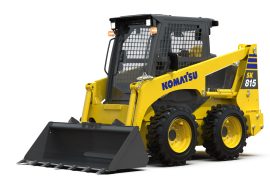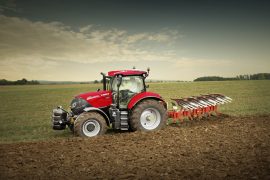AGCO the worldwide manufacturer and distributor of agricultural equipment including the Massey Ferguson, Fendt and Valtra tractor and machinery brands, reported its results for the second quarter ended June 30, 2020. Net sales for the second quarter were approximately $2.0 billion, a decrease of approximately 17.2% compared to the second quarter of 2019. Reported net income was $0.93 per share for the second quarter of 2020 and adjusted net income, excluding a non-cash impairment charge and restructuring expenses, was $1.11 per share.
These results compare to reported and adjusted net income of $1.82 per share for the second quarter of 2019. Excluding unfavourable currency translation impacts of approximately 3.9%, net sales in the second quarter of 2020 decreased approximately 13.2% compared to the second quarter of 2019, according to the company report.
Net sales for the first six months of 2020 were approximately $3.9 billion, a decrease of approximately 10.9% compared to the same period in 2019. Excluding unfavourable currency translation impacts of approximately 3.8%, net sales for the first six months of 2020 decreased approximately 7.2% compared to the same period in 2019. For the first six months of 2020, reported net income was $1.78 per share, and adjusted net income, excluding a non-cash impairment charge and restructuring expenses was $1.97 per share. These results compare to reported net income of $2.66 per share, and adjusted net income, excluding restructuring expenses, of $2.68 per share for the first six months of 2019.
“AGCO’s priorities throughout the COVID-19 crisis continues to be the safety of our employees while serving our dealers and the world’s farmers as they maintain the global food supply,” stated Martin Richenhagen, AGCO’s Chairman, President and Chief Executive Officer. “We’ve had good success with these efforts to this point, and I would like to thank our employees around the world for finding innovative solutions to keep our business running effectively and to support our customers.
“Our second quarter results demonstrated strong execution as we overcame COVID-19 related production disruptions in Europe and South America in order to deliver a solidly profitable quarter. Margin improvement in our North American, South American and Asia/Pacific/Africa regions highlighted our results. While all our factories are now open with strong order boards heading into second half of 2020, we still face a demanding environment to manage our manufacturing, supply chain and aftermarket operations.”

“Global crop production is on track for another near-record year with most farm operations working at normal levels and experiencing only minimal COVID-19 related impacts,” continued Mr. Richenhagen. “However, the consumption of grain for food, fuel and livestock feed is being negatively impacted by the economic constraints caused by the pandemic. As a result, grain inventories are expected to remain at high levels, and soft commodity prices have trended lower in the first half of 2020. Consequently, global industry demand for farm equipment is expected to be weaker in 2020 due to challenging farm economics and uncertainty caused by the pandemic. North American industry retail tractor sales increased in the first six months of 2020 compared to the same period in 2019. Growth in the sales of low horsepower tractors was largely offset by considerably weaker industry demand for high horsepower tractors and combines. While the need to replace a relatively aged fleet in the large farm sector remains, lower commodity prices and a cautious farmer sentiment are also influencing equipment demand. The special COVID-19 Aid Package for U.S. farmers and livestock producers could offset some of the impact of lower commodity prices.
“Industry retail sales in Western Europe decreased in the first six months of 2020 largely due to production constraints. Market demand was weakest in Spain, the United Kingdom, and France. Relatively dry weather across much of Western Europe is negatively impacting wheat production. Conversely, stronger grain export demand and supportive wheat prices project towards favorable farm economics for Western European farmers,” he added.
“European dairy and livestock fundamentals have stabilized after weakening earlier in the year. Industry retail sales in South America decreased during the first six months of 2020, with the decline in markets outside of Brazil. While the benefit of a strong first crop in Brazil and Argentina as well as favorable exchange rates are supporting relatively positive economics, farmers are exhibiting a cautious approach to equipment purchases due to the current economic and political environments and COVID-19 concerns.”
Europe/Middle East
AGCO’s Europe/Middle East net sales decreased 13.3% in the first six months of 2020 compared to the same period in 2019, excluding unfavorable currency translation impacts. Sales declines were driven primarily by lost production caused by the impacts from COVID-19 crisis. All of AGCO’s major European production facilities were suspended due to supply availability from late March throughout most of April, with production volumes recovering during the remainder of the quarter. Income from operations dropped approximately $143.2 million for the first six months of 2020, compared to the same period in 2019, due to lower net sales and production volumes, partially offset by expense reductions.
North America
Net sales in the North American region were flat in the first six months of 2020 compared to the same period of 2019, excluding the negative impact of currency translation. Increased sales of hay equipment, Precision Planting equipment and high horsepower tractors were mostly offset by lower sprayer and grain and protein sales. Income from operations for the first six months of 2020 improved approximately $43.6 million compared to the same period in 2019. The benefit of a richer mix of products, as well as cost control initiatives contributed most of the increase.
South America
AGCO’s South American net sales increased 17.8% in the first six months of 2020 compared to the first six months of 2019, excluding the impact of unfavorable currency translation. Increased sales in Brazil and Argentina were partially offset by lower sales in the other South American markets. The loss from operations in the first six months of 2020 was improved compared to the same period in 2019 by approximately $12.3 million. The improved South America results reflect the benefit of higher sales, a richer sales mix, as well as cost reduction initiatives, partially offset by negative currency impacts.
Asia/Pacific/Africa
Asia/Pacific/Africa net sales decreased 8.3%, excluding the negative impact of currency translation, in the first six months of 2020 compared to the same period in 2019. Sales declines were most significant in Africa and Asia and were partially offset by growth in Australia and China. Income from operations improved by approximately $2.3 million in the first six months of 2020, compared to the same period in 2019, due to a richer product sales mix and reduced expenses.
Funding Update
AGCO’s available funding as of June 30, 2020, including the $530.9 million term loan facility added during the second quarter, was approximately $1.3 billion consisting of cash of approximately $399.7 million and available borrowing capacity of approximately $869.3 million. The Company’s funding position stabilized during the second quarter with net debt approximately $125.1 million below June 2019. This indicates that the company has funding for a possible purchase of more farm machinery brands.
Outlook
In its outlook AGCO says that net sales in 2020 are expected to be approximately $8.3 to $8.4 billion reflecting lower end-market demand and the unfavourable impact of currency translation. Adjusted operating margins are expected to be below 2019 levels with the impact of lower sales and production volumes partially offset by the benefits of pricing and expense reductions.
Based on these assumptions, 2020 adjusted net income per share, excluding the impact of restructuring expenses and the goodwill impairment charge, is targeted in the range of $3.50 to $3.75. This outlook does not contemplate any further sales or production disruptions caused by the COVID-19 pandemic.





